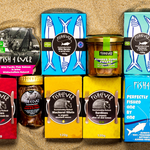You have no items in your shopping cart.
You probably know that a plant-based diet is good for the planet and as a result you may well have decided to cut back on meat. That’s fabulous and you’re also probably making a great decision in terms of health too because too much red meat in a diet, especially the intensively reared grain-fed stuff, isn’t great for your health either.
What’s far less well known is that a diet which comprises egg and fish but no meat or dairy is almost as good from a Co2 point of view as the vegan diet. Our World in Data has done the maths and they worked out that whilst the vegan diet for “everyone in the world” would reduce annual emissions by a whopping 14.7 billion tonnes Co2 per annum; the vegan + fish and eggs diets saves almost as much at 13.6 billion tonnes.
For a reference point, according to the same source, global food production emits in total emits 13.7 billion tonnes. Basically you don’t need to take fish off the menu for climate reasons – quite the opposite. In fact it might be time to substitute other proteins with fish but as long as you can be guaranteed that the fish itself is fished sustainably. Here it gets tricky, the main certification mark isn’t brilliant at identifying the most sustainable fish, it is routinely criticised by a whole number of different NGO’s and experts on environmental criteria and completely ignores the important question of who is doing the fishing and if they’re using the most targeted method. We think it should be simpler. So here are two easy rules. For tuna only trust pole and line caught tuna. In general look for small oily fish – herring, mackerel, sardines, sprats and anchovy. Why? Because these small fish are at the bottom of the trophic chain (which means they get eaten by larger fish), reproduce quickly in large quantities and are often reduced into fish oil or animal feed.
Oily fish like sardines and mackerel are a nutritional power food and one of the best sources of lean protein available. Oily fish are packed full of omega 3, which is an essential nutrient not supplied in the correct form for absorption from plant based alternatives such as flax seeds. They are also very rich in B vitamins, Vitamin D, A or E and in essential minerals like selenium, phosphorous, magnesium and potassium.
At Fish4Ever we’ve been fighting for sustainability since we started. In 2020 we went one step neutral: net zero. That means every can of Fish4Ever we sell has had its emissions counted by an independent consultancy firm using science-based protocols and standards. Food emissions are normally counted on a “per kg of food” basis but when do you eat a kg of canned tuna in one sitting?! We did our Co2 calculations per kg for the comparison point and per tin. Our sardines come out at 220g per tin, the tuna at around 400g and mackerel just over that.
Quick, easy, ready-to-eat and convenient Fish4Ever is a great low carbon food you can trust. We’ve offset the emissions to be “better than net zero” {our better than net zero policy – an explainer} but you can also rest assured that, even without that important fact, Fish4Ever can form a key part of your low carbon diet. With all the recipes we and our supporters and influencers have posted; you can also make yourself a pretty decent meal.













